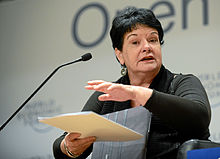Sharan Burrow
| Sharan Burrow | |
|---|---|

Burrow speaking at the 2013 World Economic Forum meeting
|
|
| 2nd General Secretary of the International Trade Union Confederation | |
|
Assumed office June 2010 |
|
| Preceded by | Guy Ryder |
| 9th President of the Australian Council of Trade Unions | |
|
In office 2000–2010 |
|
| Preceded by | Jennie George |
| Succeeded by | Ged Kearney |
| 1st President of the International Trade Union Confederation | |
|
In office November 2006 – June 2010 |
|
| Preceded by | new office |
| Succeeded by | Michael Sommer |
| President of the International Confederation of Free Trade Unions | |
|
In office 2004–2006 |
|
| Succeeded by | organisation abolished |
| President of the Australian Education Union | |
|
In office 1992 – ? |
|
| Personal details | |
| Born |
12 December 1954 Warren, New South Wales, Australia |
| Political party | Australian Labor Party |
| Alma mater | University of New South Wales |
| Profession | Teacher |
Sharan Burrow (born 12 December 1954) is the General Secretary of the International Trade Union Confederation (ITUC) and a former President of the Australian Council of Trade Unions (ACTU) (2000–2010). She is the first woman to become General Secretary of the ITUC since its foundation in 2006, and was the second woman to become President of the ACTU.
Burrow was born in Warren, New South Wales to a family with strong involvement in the labour movement. She graduated in teaching with the University of New South Wales in 1976 and became a teacher in the early 1980s, which allowed her to become involved in the New South Wales Teachers Federation. She later became President of the Bathurst Trades and Labor Council. Before becoming President of the ACTU she was also President of the Australian Education Union (AEU) in 1992.
Burrow was elected President of the ACTU in May 2000. The most significant public event of her term of office was the ACTU's 'Your Rights at Work' campaign against the Howard Government's 'WorkChoices' industrial relations legislation in the lead up to the 2007 Australian federal election. At the election, the Howard government was defeated, and the incoming Rudd Government repealed the WorkChoices legislaton and replaced it with the Fair Work Act 2009, which was praised by the ACTU for its restoration and protection of many workers' rights (such as the right to organise and negotiate collectively) which has been removed or jeopardised by the earlier legislation.
...
Wikipedia
